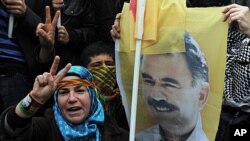As Turkey heads to the polls Sunday, the Islamic-rooted AK party is enjoying a comfortable lead. But in the country's predominantly Kurdish southeast, the party is facing stiff competition as secular nationalist and religious Kurds come together to push for Kurdish nationalism.
Every Friday in Diyarbakir, Muslim worshipers boycott Friday prayers at the state controlled mosques to hear sermons in their native Kurdish language. Despite the blistering midday sun, thousands turn out to worship in front of the city wall.
Until the late 1980s, the Kurdish language was banned. Under successive governments restrictions slowly have been eased, and it can be now be spoken in public, but in the mosques Turkish remains the only official language.
The Islamic faith is strictly controlled by Turkey's state body called the Diyanet, which oversees the appointment of imams and writing of sermons.
Leading the charge of protests across the predominantly Kurdish southeast, are a group of retired imams and Islamic scholars from a group called Diay-der. Its head is Zahit Ciftkuran who says they decided on their protest after their appeals for reform were ignored.
"We had this demand of the Diyanet which controls religion in Turkey to have the sermons in our native language, because according to Islam you're obliged to listen and to understand what is being said. But our demands were ignored," said Zahit Ciftkuran. "Instead the government sent 10,000 new imams to this land. Who have no connection to this land, so it's a kind of religious assimilation."
The protests appeared to have caused problems for Prime Minister Recep Tayyip Erdogan, whose party prides itself as the defender of religious freedom.
In a keynote speech last week in Diyarbakir, Erdogan's key note speech was devoted to lambasting the protest.
"They refuse to pray behind an imam appointed by the state, " said Prime Minister Erdogan. "But they are not religious. They see Ocalan as a prophet. They are cheating you. Let us teach them a lesson.
Mr. Erdogan's attack on the Kurds and Abdullah Ocalan - the jailed leader of the Kurdish rebel group, the PKK - caused dismay among many Kurds even among some of his senior Kurdish members. The deputy head of AKP in Diyarbakir, Muhammed Akar, says the mosque boycott is an indication of an important change in the region's politics.
"I personally support the protest," said Muhammed Akar. "I think it is positive as it is a basic right, even though it's not my party's policy, he says. The demand for religious freedom is coming from the growing religious Kurdish movement. This region is traditionally devout and religious movements are now re-establishing themselves. Four or five years ago, I feared that there would be a clash between secular nationalist and religious Kurds, but instead for the first time Kurdish nationalism has come together with religion."
Supporters of the main pro Kurdish Peace and Democracy Party, or BDP, are working hard with only a few days left to the polls. In Diyarbakir two out of the six candidates supported by the BDP are well known religious figures within the city.
One of them is Altan Tan. He says along with the traditional key demands for Kurdish education and local autonomy is the demand for Kurdish religious rights.
"When Luther published the bible in the German language, nobody could understand the bible until then," said Altan Tan. "Also Kurds want to teach religion in their language. If they don’t solve this problem, they could not do anything. We will make Kurdistan, like Egypt, like Yemen, like Syria. We don’t want this. We want a new constitution, we want an agreement with the government, which will give us our rights."
The Turkish army is rumored to be increasingly alarmed over the boycott of mosques and the change in the Kurdish movement.
In response the Diyanet has taken tentative steps to allow Kurdish to be used in some mosques, religious chants like this one, which is being sung by Omer Kilic.
Kilic sung this at a religious ceremony last week in Diyarbakir's main mosque, the Ulu Cami. For him it was a special event.
He says, it was a beautiful evening, some of the old men were crying, as it was for many their first time to hear the mevlid sung in their language in a mosque. It's a start, he says.
Whoever wins the election will face a rejuvenated and more united Kurdish movement, demanding fundamental reforms.
Kurds Unite in Southern Turkey in Run-Up to Election
- By Dorian Jones




